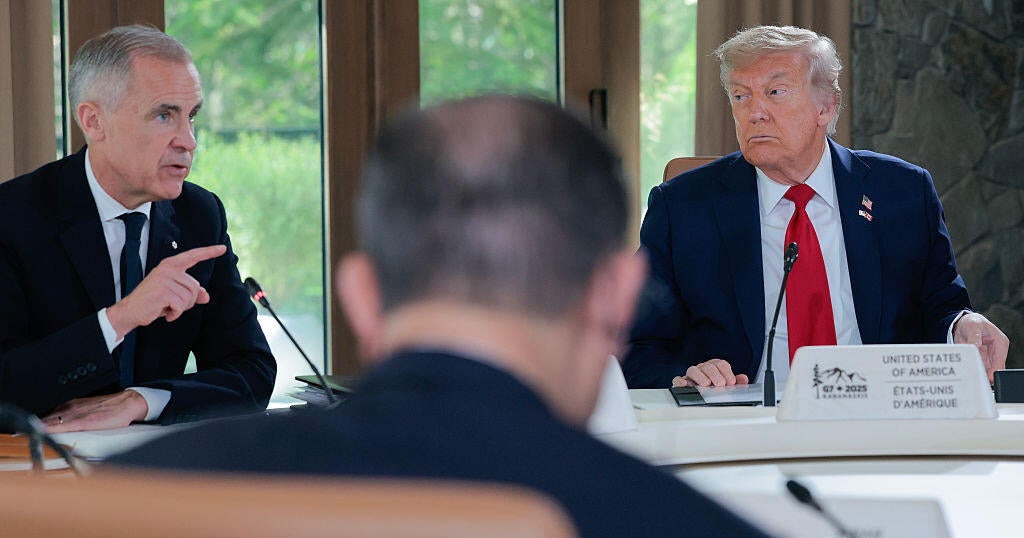President Trump has made a sudden decision to cut his trip short during the annual G7 summit in Canada, directing his focus back to Washington amidst escalating tensions in the Middle East. According to Press Secretary Karoline Leavitt, the president’s early departure is due to significant developments related to the Israel-Iran conflict. This marks a crucial time as both nations face off in intense hostilities, prompting international attention and concern.
| Article Subheadings |
|---|
| 1) Decision to Return Early Amidst Crisis |
| 2) Insights into the Israel-Iran Conflict |
| 3) Diplomatic Efforts and Communication |
| 4) The Role of the United States |
| 5) Tensions and Future Prospects |
Decision to Return Early Amidst Crisis
The announcement about President Trump cutting short his trip was made on Monday evening by Press Secretary Karoline Leavitt. Upon arriving in Canada for the G7 summit on Sunday, he met with various world leaders, including Justin Trudeau, the Prime Minister of Canada, and Keir Starmer, the Prime Minister of the United Kingdom. However, sources indicated that a re-evaluation of the ongoing crisis in the Middle East, particularly the Israel-Iran conflict, necessitated the president’s return to Washington. According to Leavitt, Trump’s decision followed discussions about the importance of addressing critical issues back in the capital, highlighting the administration’s attentiveness to international affairs.
Insights into the Israel-Iran Conflict
The ongoing conflict between Israel and Iran has escalated dramatically in recent weeks, with both sides engaged in military exchanges that are among the most intense in decades. Reports detail that Israel has launched multiple airstrikes targeting Iranian military and nuclear facilities. On the other hand, Iran has responded with missile and drone strikes aimed at Israel. The violence has raised alarm throughout the region and has implications for global stability, making it a focal point of discussions at the summit. The conflict is not merely a military confrontation but has deep historical, political, and ideological roots that influence both nations’ strategies.
Diplomatic Efforts and Communication
During his meetings on the sidelines of the G7 summit, President Trump mentioned that he has maintained open channels of communication regarding the Israel-Iran situation, stating, “I’ve spoken to everybody.” He emphasized his belief that a deal could potentially be reached, urging Iran to reconsider its approach. The president’s tone suggested optimism that diplomatic solutions exist, even amidst severe military actions. Furthermore, reports indicated that Iran has signaled a desire to de-escalate the situation; however, Trump reiterated the necessity of immediate dialogue to prevent a worsening conflict, mentioning the past 60 days as a critical timeline for negotiations.
The Role of the United States
The U.S. has been actively involved in the developments between Israel and Iran, though officials maintain that the American military is not participating directly in Israeli operations. Prior to the recent escalation, the U.S. government had communicated its position clearly: while supporting Israel’s right to defend itself, it has also cautioned against Iranian aggression, particularly concerning U.S. military bases in the region. The administration’s approach has been a balancing act between firm support for its allies and cautious engagement with adversaries, reflecting the complexities of modern international relations.
Tensions and Future Prospects
The situation between Israel and Iran is precarious, with leaders from both nations engaged in a series of actions that could provoke further hostilities. Israel’s airstrikes have included targets in the heart of Iranian territory, raising the stakes significantly. The international community watches closely, aware that any miscalculation could lead to greater conflict. Should diplomatic efforts falter, the likelihood of a prolonged confrontation grows. Moreover, the ongoing turbulence poses risks not just locally, but also for broader geopolitical stability, underscoring the importance of high-level discussions and proactive measures.
| No. | Key Points |
|---|---|
| 1 | President Trump will leave G7 summit early due to Middle Eastern conflicts. |
| 2 | The Israel-Iran conflict has intensified, with significant military actions. |
| 3 | Trump encourages Iran to engage in diplomatic negotiations. |
| 4 | The U.S. reaffirms support for Israel while cautioning against Iranian aggressions. |
| 5 | The complex geopolitical landscape requires careful negotiation and communication. |
Summary
The unfolding developments between Israel and Iran continue to capture international attention, with President Trump prioritizing the situation upon his early return from Canada. The G7 summit highlighted the multifaceted nature of global diplomacy where military actions intertwine with negotiations. As tensions mount, the imperative for dialogue becomes increasingly significant, raising questions about the future stability of the region and the role of the United States in fostering peace.
Frequently Asked Questions
Question: Why did President Trump cut his trip short?
President Trump cut short his trip to Canada due to escalating tensions in the Middle East, particularly the Israel-Iran conflict, which required his immediate attention back in Washington.
Question: What is the current state of the Israel-Iran conflict?
The Israel-Iran conflict has intensified recently, with both sides exchanging military strikes, marking some of the most intense fighting in years.
Question: What role is the U.S. playing in the Israel-Iran situation?
The U.S. supports Israel’s right to self-defense while cautioning Iran against any actions that threaten U.S. military bases in the region. The Biden administration is engaged in diplomatic discussions, urging both sides to seek a peaceful resolution.
